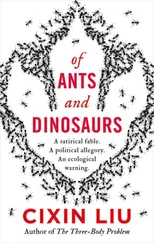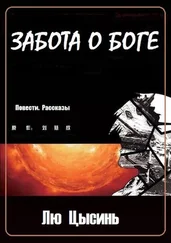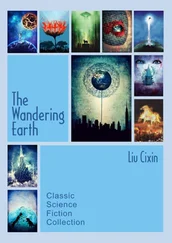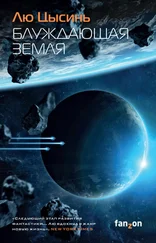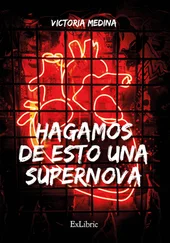“The outcome? The outcome of folding a piece of paper in half thirty-five times? Don’t make me laugh,” Scott said derisively.
“For example, how thick will that folded paper get?”
“Around as thick as a Bible, I’d guess,” Davey said.
Vaughn shook his head.
“Around knee-high,” Harvey said.
Again, Vaughn shook his head.
“As high as the command center?”
Vaughn shook his head.
“You don’t mean it’d be as high as the Pentagon?” Scott said mockingly.
“This sheet of paper is around zero point one millimeters thick. Calculating with that value, after thirty-five folds, it would be 6,871,950 meters thick, or around 6,872 kilometers. That’s roughly the radius of the Earth.”
“What? For just thirty-five times? You’ve got to be joking!” Scott said loudly.
“He’s right,” Davey said. He was no dummy, and had quickly made the connection to the Indian legend of the king and the chessboard.
Vaughn tucked the folded paper into Davey’s shirt pocket. Looking around at the dumbstruck young commanders, he said slowly, “Never be too optimistic about your own judgment, particularly when it comes to the course of history.”
Davey bowed his head and dejectedly accepted his loss. Then he said, “I admit that our minds are simpler than yours. If everyone had a mind like yours, the world would be a really scary place. Still, we can’t be certain of success, nor can we be certain of failure. Why not give it a try? We want to! There’s no way we can be stopped!”
“Mr. President,” Vaughn said coldly. “That is your right. I’ve said all I need to.”
In the first rays of dawn over the Antarctic wilderness, the Supernova Era advanced into the most dangerous place in its young history.
Before the start of their ICBM match with the American children, the Chinese children secretly moved their command center. They loaded all personnel and communications equipment into fourteen helicopters and flew forty-odd kilometers inland. Here the geography was somewhat different from the coast, and featured conical hills where the snow hadn’t entirely melted. The command center was set up in tents backed up against one hill, fronting on a broad plain in the direction of the base.
“Second Artillery Corps Command called to ask what we should load into the warhead,” Lü Gang said to Huahua.
“Hmmm… how about tanghulu?”
Then the children scanned the sky near the coast through binoculars, and a young advisor wearing an earpiece provided them with a general direction, using data transmitted to him by the distant radar warning center about the approaching American ICBM.
“Heads up. They say it’s getting close. Heading 135, inclination 42. Just over there. You should be able to see it now!”
The early-morning Antarctic sky was a deep, dark blue, and scattered stars were still visible, but it seemed blacker than it had during the long night owing to the greatly diminished southern lights. A point of light stood out against the dark blue, moving rapidly but slower than a shooting star. It had a short fiery tail visible through binoculars, caused by air friction during reentry. Then the light disappeared, and nothing was visible in the blue heavens, whether by naked eye or through binoculars, as if it had melted into the infinite darkness. But the children knew that the missile’s warhead had entered the atmosphere and was following a precise, gravity-guided trajectory toward its target.
“Good. It’s target is the base. Or more precisely, the command center!” called the advisor with the earpiece.
“What’ll be in the warhead this time?”
“Maybe Barbie dolls.”
The Antarctic dawn was suddenly bright as midday.
“A supernova!” exclaimed one child in fear.
This was a familiar sight to the children, one they knew in their bones. Indeed, it closely resembled a supernova blast, and the blinding light threw the land and hillside into sudden, sharp clarity. But this time, rather than turning blue, the sky turned deep purple. The light came from the direction of the ocean, and when the children looked toward it, they saw the new sun hanging over the horizon. Unlike the supernova, this sun was a ball larger than the actual sun and so fierce they could feel its heat on their faces.
Realizing what had happened, Lü Gang shouted, “Don’t look at it. It’ll hurt your eyes!”
They all shut their eyes, but the intensifying glare penetrated their eyelids and remained painfully bright, making them feel like they had fallen into an ocean of radiance. They clapped their hands to their eyes, but the light pierced the gaps between their fingers. They stayed in that position until the world darkened again, and then carefully removed their hands. It took their burnt-out eyes some time to readjust.
Lü Gang asked them, “How long do you think that sun lasted just now?”
They thought back on it, and said it seemed like at least ten seconds.
He nodded. “I think so too. Judging from the duration of the fireball, it might have been in the megaton class.”
Now that their vision had returned, the children looked out toward where the sun had appeared and vanished. Something white was rapidly expanding on the horizon.
“Cover your ears!” Lü Gang shouted. “Quickly! Cover your ears!”
They covered their ears and waited, but no explosion came. The mushroom cloud on the horizon, silvery white in the morning light, now touched the sky. The contrast it posed with the land and sky was frankly surreal, as if a gargantuan fantastic image had been superimposed upon a realistic painting. The children stared in silence, and some of them subconsciously lowered their hands from their ears.
Lü Gang shouted again, “Cover your ears! Sound takes two seconds to reach us.”
They covered their ears tightly, and then the ground began to rumble beneath their feet like the surface of a charged drum, throwing dirt and snow knee-high in the air, and sending the snow cover down the hill as if it had melted. The noise penetrated their flesh and bones, bored into their skulls, and they felt as if their bodies were being broken apart and scattered to the four winds, leaving their terrified souls to quiver on the ground.
Lü Gang shouted, “Get behind the hill for cover. The shock wave will be here any moment!”
“A shock wave?” Huahua cocked an eye at him.
“That’s right. It might die down into a stiff wind by the time it reaches us.”
As the children retreated to the back of the hill, a sudden squall picked up around them, ripping the tents from their stakes and sending the equipment inside flying. Half the helicopters on the hillside were knocked over before flying snow whited out the entire scene, but they heard the sound of flying stones pelting airframes. The gale lasted for about a minute before rapidly slackening and finally dying away altogether, letting the snow and dust return gently to the ground. As the curtain fell, it revealed a hazy firelight on the horizon. The mushroom cloud was less distinct now but far larger, and now took up half the sky. The wind had blown its top portion to one side, giving it the look of a gigantic monster with a wild head of hair.
“The base is destroyed,” Lü Gang said soberly.
All communications from the base had been severed, and when they looked toward it through the dust that had yet to settle, all they could see was the dim fire on the horizon.
An advisor came over to tell Huahua that the American president was calling him. Huahua asked, “Will replying give away our position?”
“No. The transmitter is in a different location.”
Davey’s voice came through the wireless receiver. “Hey, Huahua, looks like that atom bomb didn’t have your name on it. You really are clever fellows to think of moving your command center. I’m glad you’re still alive. I’d like to let you all know that we’re starting the new game! Nuclear bombs!” He laughed. “It’s the greatest! Wasn’t that new sun pretty?”
Читать дальше
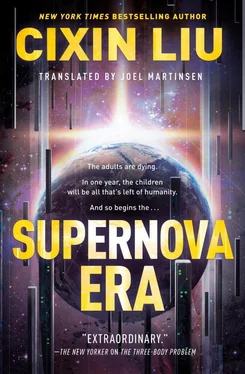
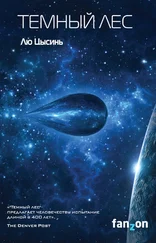
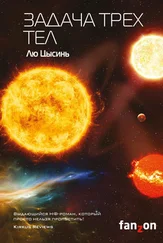
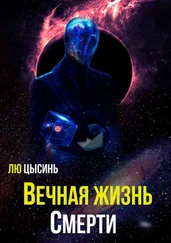
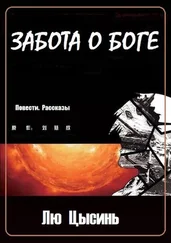
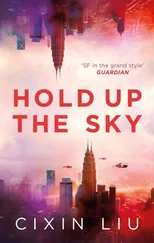
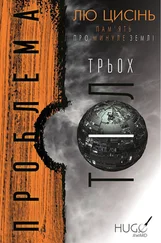
![Лю Цысинь - Эпоха сверхновой [litres]](/books/393110/lyu-cysin-epoha-sverhnovoj-litres-thumb.webp)
